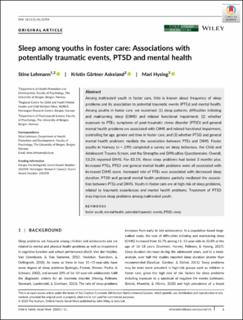Sleep among youths in foster care: Associations with potentially traumatic events, PTSD and mental health
Journal article, Peer reviewed
Published version

View/
Date
2021Metadata
Show full item recordCollections
Abstract
Among maltreated youth in foster care, little is known about frequency of sleep problems and its association to potential traumatic events (PTEs) and mental health. Among youths in foster care, we examined: (1) sleep patterns, difficulties initiating and maintaining sleep (DIMS) and related functional impairment; (2) whether exposure to PTEs, symptoms of post‐traumatic stress disorder (PTSD) and general mental health problems are associated with DIMS and related functional impairment, controlling for age, gender and time in foster care; and (3) whether PTSD and general mental health problems mediate the association between PTEs and DIMS. Foster youths in Norway (n = 299) completed a survey on sleep behaviour, the Child and Adolescent Trauma Screen, and the Strengths and Difficulties Questionnaire. Overall, 53.2% reported DIMS. For 82.1%, these sleep problems had lasted 3 months plus. Increased PTEs, PTSD and general mental health problems were all associated with increased DIMS score. Increased rate of PTEs was associated with decreased sleep duration. PTSD and general mental health problems partially mediated the association between PTEs and DIMS. Youth in foster care are at high risk of sleep problems, related to traumatic experiences and mental health problems. Treatment of PTSD may improve sleep problems among maltreated youth.
